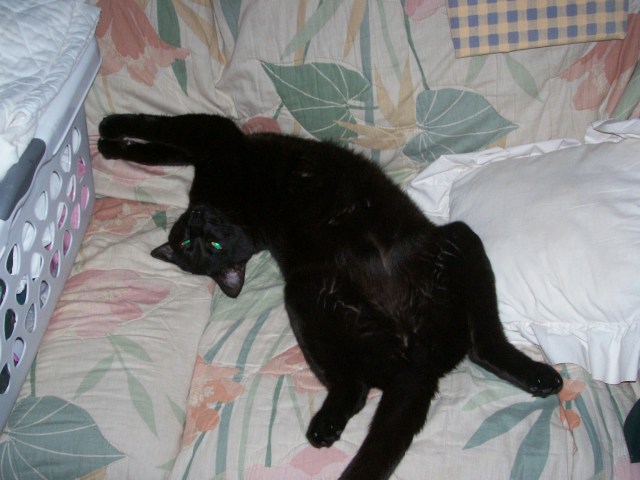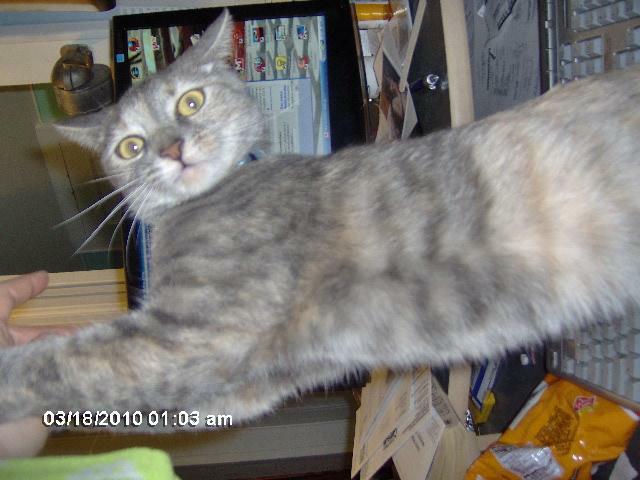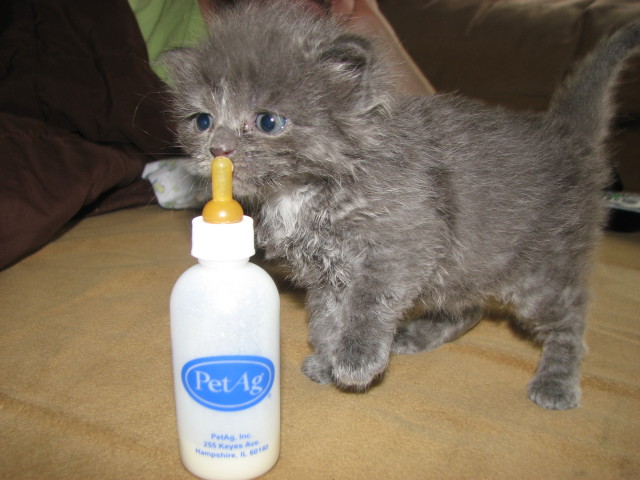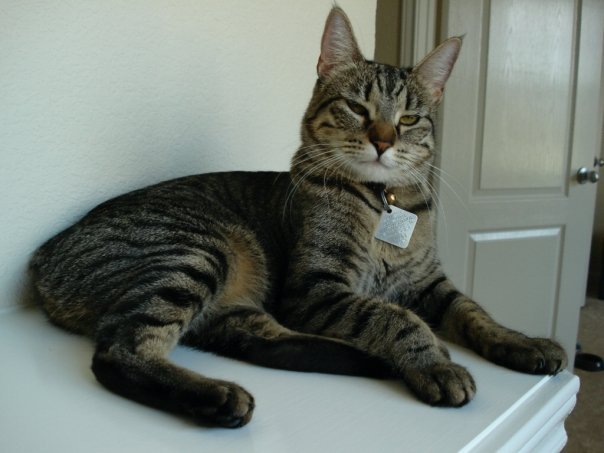Questionmy sisters cat just had 4 kittens and the one i want has a clef. its not that bad cause she is eating well. but my sister has some conserns because her teeth are showing through. now my question is will this kitten need surgery or not?
AnswerLynette,
I'm not entirely sure that I have a full understanding of your situation - you say that the cat just had 4 kittens, you suspect that one kitten may have a cleft palate what I'm wondering about is what you mean by saying that the teeth are showing through since kittens aren't normally born with teeth. Now to address the issue of the cleft palate, I really can't tell you for sure whether the vet will recommend surgery to repair this kitten's palate or not. The vet's recommendations about whether or not a kitten will require surgery to repair this defect and when this surgery needs to happen really depends on the severity of the damage to the palate as well as the possibility that any other defects may be found when the vet examines this kitten. Sometimes newborn kittens with cleft palates appear to be nursing well, but they actually end up with a small amount of mom's milk or in the case of older kittens food and water in their nose which may not be noticeable if the problem is slight and this is obviously not a good thing for these little ones.
There's a fairly good chance that the kitten will require surgery, but I can't tell you how likely this is, when the repair will need to be done or how much the surgery to repair the palate is going to cost, this is information that only a vet who has examined the kitten can provide and unfortunately I'm not a vet. Depending upon the severity of the cleft surgery may be required sooner rather than later in order to prevent serious problems with breathing, eating and drinking as this little one gets older so I would recommend that you consider having the kitten assessed by a vet as promptly as possible in order to get an idea of what this kitten will need in terms of treatment and the extent of the financial, personal and time commitments required to care for this kitten. The veterinarian will be able to go over the specifics of surgical risks, whether or not your kitten needs surgery, as well as basics like what is likely to happen if this congenital defect is left untreated and how this defect will affect your kitten during his/her lifetime.
It may be worth seeking a couple of different opinions because just like human doctors, veterinarians sometimes have varying opinions on what types of treatment an animal needs and of course treatment costs will vary between practices, although it's important to consider what procedures and services are included in each price because sometimes you get what you pay for which isn't necessarily a good thing. Your veterinarian will also be able to offer you more detailed information about the severity of this kitten's birth defects and make recommendations for a treatment plan tailored to treat this kitten's condition and ensure s/he has the best possible chance at living a normal, healthy life. The concern in kittens that have visible birth defects is that there is a chance that there may be other abnormalities that aren't obvious just by looking at the kitten so the vet may find other problems during this kitten's exam which could affect the outcome of treatments.
I also wanted to raise the issue of the serious pet overpopulation problem affecting shelters and rescue organizations worldwide. Every day healthy, adoptable animals are euthanized in shelters worldwide simply because there aren't enough resources, money or space to house them indefinitely until their forever family comes along to adopt them. Spaying and neutering pets is a responsible and ethical way to save lives by preventing much loved pets from contributing to the already serious problem of pet overpopulation. There are of course many good medical and behavioral reasons to spay or neuter pets besides the obvious benefit of humane population control. Spaying and neutering cats prevents uterine, ovarian and testicular cancers. The earlier in life that a cat is spayed or neutered the less likely s/he is to develop breast or prostate cancers. Female cats that haven't been spayed are at risk of developing a potentially life threatening uterine infection called pyometra which causes the womb to fill with pus, if the uterus ruptures and spreads pus throughout the abdomen the cat's chances of survival are pretty bleak. The only treatment for pyometra is an emergency spay, this surgery is far more costly than a routine spay, there are more risks associated with anesthetizing a sick cat, the surgery takes longer and is far more complex than a routine spay. If the cost of spay/neuter surgery is an issue I keep a binder full of resources in Canada and the US which provide low cost spays and neuters. If you require this information please feel free to contact me again with the province or state that you are writing from and I will do my best to help you find resources in your area that will help spay/neuter your cats.
The leading cause of death in North American cats is euthanasia due to behavioral problems. Spaying and neutering cats helps to prevent serious behavioral problems including house soiling or using urine or feces to mark their territory outside of the litter box. Cats that are spayed or neutered aren't as likely to get into fights with other cats, they don't howl to advertise their availability to mate or caterwaul to determine which tom gets to breed with a receptive female. Cats that have been sterilized also don't wander as far away from home and the chances that they will develop different forms of aggression towards people are minimized. It's very important to keep a queen who has just given birth indoors and away from any intact male cats because female cats can become pregnant very shortly after giving birth this causes stress on the queen's body which isn't healthy for the resulting kittens or their mother. Although every surgery poses risks spay/neuter surgeries are routine and the type of anesthesia that's currently used helps to minimize the risks of complications related to the anesthetic. Spay surgery involves the removal of the uterus and ovaries, this helps to reduce hormone levels that can cause certain medical problems as well as preventing the cat from reproducing. Spayed cats do not go into season so their caregivers won't be forced to listen to howling and wailing as the queen tries to attract the attention of any intact male cats in the area. Contrary to popular belief intact female cats can spray urine against walls and other surfaces to mark their territory - this isn't something that's limited to male cats. Cats that have been spayed or neutered live longer, healthier lives and they're less likely to develop behavioral issues that may result in caregivers placing them in shelters or having them euthanized by private veterinarians.

 cat breed?
QuestionQUESTION: I have a solid black male cat, and I
cat breed?
QuestionQUESTION: I have a solid black male cat, and I
 my cat is REALLY long, like a weasel!
QuestionQUESTION: Im hoping you can help me identify my
my cat is REALLY long, like a weasel!
QuestionQUESTION: Im hoping you can help me identify my
 bottle feeding orphan kitten.
QuestionQUESTION: I rescued my kitten when he was 2 wee
bottle feeding orphan kitten.
QuestionQUESTION: I rescued my kitten when he was 2 wee
 Reclusive kitten
QuestionMy cousin found an abandoned kitten and where s
Reclusive kitten
QuestionMy cousin found an abandoned kitten and where s
 18 year old cat has blood clots in urine
Question
Tucker
My 18 year old male neutered cat is hyp
18 year old cat has blood clots in urine
Question
Tucker
My 18 year old male neutered cat is hyp